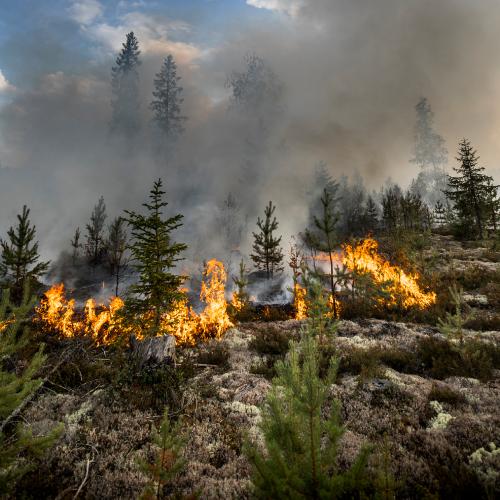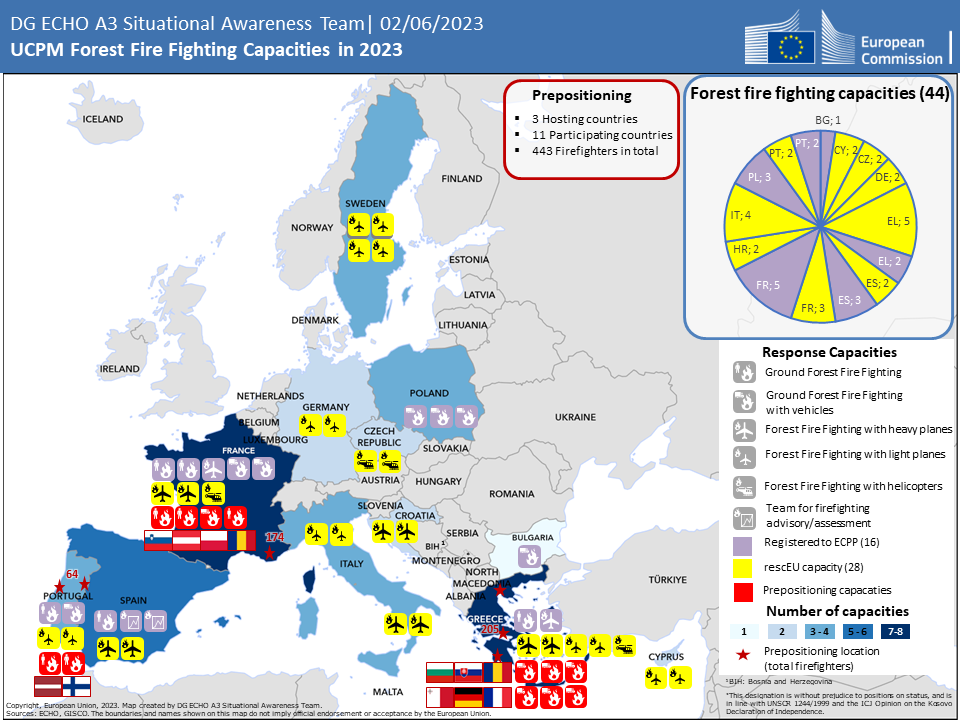
‘Success is based on preparation’ – ERCC ready for the 2023 wildfire season
With drought conditions continuing throughout 2023 the ERCC, in support of the UCPM, is preparing for the upcoming wildfire season with more capacities than ever before.
Wildfires remain one of the most prominent disaster risks in Europe, and are increasing in intensity and geographic scope. In terms of burnt areas, 2022 was the second worst year in Europe since 2006, with 2017 being the most catastrophic. The potential numerous requests for assistance to the Union Civil Protection Mechanism (UCPM), the threat posed by wildfires to human lives, and the risk of economic damages are just some of the reasons behind the attention paid to wildfires across the disaster risk management cycle under the UCPM.
“This year has already started much drier than average, and it may be a very busy summer, so we need to be ready,” said Commissioner for Crisis Management Janez Lenarčič.
After a dry season in Europe in 2022, persistent drought conditions have continued in the beginning of 2023. Based on data from the last 40 years, areas in north-eastern and south-eastern Europe are likely to experience a much higher than average Fire Weather Index (FWI) in the upcoming summer. A high value of FWI indicates a high probability of having larger wildfires and burnt areas.
The UCPM will enter the 2023 wildfire season with more capacities than ever before. The Mechanism counts on the European Civil Protection Pool (ECPP): two modules with planes (consisting of two Canadair each), five ground firefighting modules, seven modules with vehicles, and two forest fire advisory/assessment teams are pre-committed by UCPM member states to be deployed if they are needed. Should the availability of ECPP response capacities be exhausted, the EU has the rescEU fleet as a safety net. This has been doubled, and now includes 24 airplanes and 4 helicopters from 10 UCPM member states.

Furthermore, 11 member states will send almost 450 firefighters to be pre-positioned in France, Greece and Portugal – all areas at high risk – for different periods in the wildfire season.
An Emergency Response Coordination Centre (ERCC) Wildfires Support Team will be operational from mid-June until mid-September. The team will consist of ERCC Duty Officers, national experts, and one ARISTOTLE wildfire expert as part of the Scientific Technical Assistance Facility (STAF). The team will assist the ERCC through situational analysis and operational support, ensure common situational awareness, and enable efficient information exchange between the wildfire-prone countries.
Lastly, the ERCC Situational Awareness Sector, in close cooperation with ARISTOTLE, has set up a monitoring service and a 24/7 wildfire emergency reporting service at European and global level. This will capitalise on scientific expertise and early warning systems, such as the European Forest Fire Information System (EFFIS) and the EFFIS Decision Support System.
Upon request from the ERCC or a UCPM member or participating state, an emergency report indicating fire danger forecast and wildfire-related information derived from earth observation data will be available within three hours. The EU’s Copernicus emergency management service and its satellite mapping component complements operations with detailed assessments from space.
While this summer is expected to be hot and dry, the ERCC and the UCPM are preparing.
This article is from issue 9 of the Knowledge Network newsletter, out soon. Discover our past issues on the Knowledge Network newsletter page!